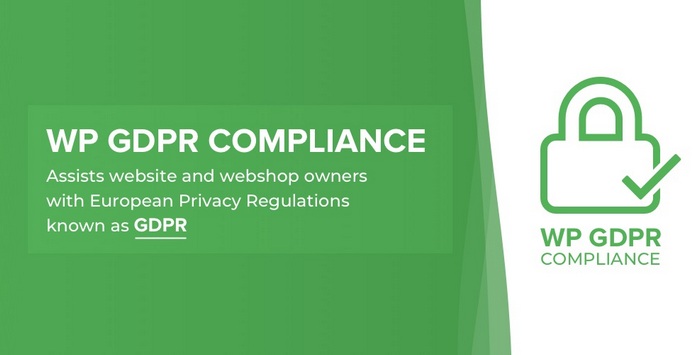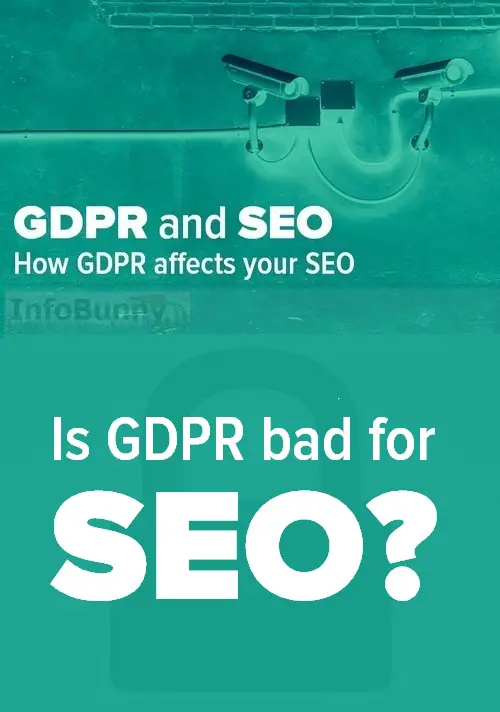So GDPR and SEO, hmmm isn’t it always the way, you get your site setup and you’re happy with your SEO and how everything is working and then you’re sent another curveball?
Well GDPR is the latest curveball that you need to handle and it affects everyone who owns and runs a website.
Before we get too far into GDPR and SEO and what it all means etc I just need to give you a short Disclaimer and point out that I am not a Privacy Law expert and that everything that I write in this article is just my thoughts, ideas and opinions and are in no way sound legal advice.
I’m one of you guys looking for the answers and offering what I consider to be the best options.
With that said here is my take on GDPR and SEO – What does GDPR mean for SEO?

What is GDPR?
GDPR stands for the General Data Protection Regulation.
Way back in January 2012, the European Commission set out plans for data protection reform across the European Union in order to make Europe fit for the digital age. Almost four years later, an agreement was reached. One of the key components of the reforms was GDPR.
GDPR is a new set of rules designed to give EU citizens more control over their personal data.
The General Data Protection Regulation requires that webmasters gain their reader’s or users’ consent to collect cookies for an enhanced experience.
You are required to collect usernames on comments made to blog posts.
You also have to seek consent on your site contact form to gather the name and email address of anyone using the contact form.
With regards to visitor data, you must offer a means for the user to request their information and if requested delete the information and everything must be laid out in an updated Privacy Policy along with a Terms of Service Policy.
You are also required to give a “We Use Cookies” notice on your site.
If you are a first-time visitor to Infobunny you would have already seen ours and had to opt-in to close it.
Oh No my Mailing List
You have spent years building your list. Now you are going to have to email your list and ask everyone to opt-in again to your list and give consent on all of the above.
Total GDPR Compliance
You are required to be GDPR compliant but if your Theme Developer is not compliant then neither are you.
If you are using a plugin that is not compliant then again neither are you
The good news is that theme and plugin developers are becoming compliant, they have to or they could be facing some big fines. They will also lose users and their users opt-out in favor of an alternative that takes GDPR seriously
So how does GDPR affect SEO?
Infobunny is a self-hosted WordPress site so let’s tackle all the questions from a WordPress point of view.
GDPR does affect your SEO but the question is how? and what can you do to stop it from having a negative impact on your site?
To understand how GDPR affects SEO you must first understand search engine optimization.
Chances are for your WordPress Site to become compliant with GDPR you’re going to need to install one or two new plugins that will help you.
As we know plugins so your site down and a slow site is not a happy site.
The load time and speed of your site have never been more important now that we have the Google Mobile-First Index where Google now takes mobile results and shows those ahead of desktop results.
If you have a slow mobile site then you are going to have a negative impact on your SEO.
What does GDPR mean for SEO? The User-Experience
UX is also big news with Google’s Mobile-First Index.
Your site needs to display correctly on all devices, desktop/laptops, mobile, and tablets.
Opt-in consent boxes and pop-ups are bad news for the user experience if they display badly.
Yes, you now have to have them to be compliant but look for sensible user-friendly ways of displaying your GDPR consent boxes.
The mobile UX is super important now for SEO.
My take on Redirects
In recent days on visiting a few sites, I have come across webmasters who upon arriving on the page give a timed redirect to their new Privacy Policy.
Now it is great that they are working to be GDPR compliant but let’s think about this for a second.
Is it a good idea to redirect away from content that a visitor wants to see?
Time on-page is a big SEO ranking factor. The longer someone is on a page the better the signal to Google that this is quality content and the better your search results.
If you are bouncing your visitors right out from a page they want to see then what is the message that you are sending Google?
You have to be compliant with GDPR but you also have to be smart with how you are compliant
Go to any SEO experts page and your not going to see them redirect away to their Privacy Policy. You will probably see a small unobtrusive checkbox that you need to close but you are not going to see them redirect away.
NoFollow or DoFollow links
Should you nofollow links to your Privacy Page or Terms of Service?
Well, I see no reason for making them nofollow. They will by default become valuable pages and Google wants to see them so it really doesn’t make any sense to me to apply the nofollow attribute.
Linking to these pages should be seen as just part of your natural internal linking strategy.
NOW here is what you have been waiting for
GDPR and SEO best practices
Look for smart ways to be compliant with the General Data Protection Regulation.
WordPress Plugins are becoming compliant so before you rush off and install a number of new plugins to deal with your compliance first investigate what you already have installed and use on a daily bases.
Askimet the comments spam prevention plugin has added an option to add a tracking notification to your contact form.
There was a message on my admin dashboard saying
Akismet & Privacy.
To help your site be compliant with GDPR and other laws requiring notification of tracking, Akismet can display a notice to your users on your contact form. This feature is disabled by default, however, if you or your audience is located in Europe, you need to turn it on.
For a detailed guide on how to use Askimet head over to our friends at WPBeginner and read:
What is Akismet and Why You Should Start Using it Right Away.
I use a plugin call WPForms (no affiliation) for my contact form and guess what they now offer GDPR enhancements that add a checkbox notice about collecting their name and email.

I did, however, add one new plugin to my site and that was WP GDPR Compliance (no affiliation)
WP GDPR Compliance is a free WordPress plugin that basically covers all the bases.

WP GDPR Compliance allows you to
- Add a GDPR checkbox that when activated will be added automatically just above the submit button.
- Data Request – Monitor who has requested their data
- Check List of compliance, turn each section that corresponds to your site type green and your all set
- Create and manage your Privacy Policy and Data Request pages
WP GDPR Compliance doesn’t currently support an EU Cookie Consent feature, but being from the Uk Infobunny has had a Cookie Consent Feature for a couple of years now already.
GDPR and SEO – Do you have a Privacy Policy and Terms of Services Pages
Well, you should have because although they are often the most boring pages on a site Google still looks for them as a sign that your site is a professional credible option for them to show to people.
And having a Privacy Policy and Terms page is not only good for SEO but the major requirement for GDPR.
Now the thought of creating a Privacy Policy may have you quaking I your boots but there is no need to fear them.
The latest version of WordPress (WordPress 4.9.6 Privacy and Maintenance Release) offers you a template for creating your own Privacy Policy
To access the Privacy Policy Template go to Settings > Privacy and you will land on a page similar the screen capture below.

You can then either select a page that you already have to edit or create a new Privacy Policy.
Now there are going to be sections of the template that you don’t need and sections that you feel you will need to add, depending on what your site does.
But the main point is really just to be as transparent as possible with what information you store, how you use it and how you protect it.
Before you create your policy it might be a good idea to check other webmasters pages for inspiration.
You can find mine linked above in this article and also in the menu at the top and linked in the footer.
I am happy for you to borrow any sections you feel that you need, but do not just cut and paste. Rewrite what you read and put it into your own words.
Cutting and pasting content will not help your sites SEO optimization.
GDPR and SEO the future
It is not beyond the realms of possibility that GDPR becomes a ranking factor for SEO within the Google SEO Algorithm.
We already know that having a Privacy Policy and a Terms page is good for SEO.
And we have seen Google pushing webmasters towards getting https Security Certificates.
Who is to say that they won’t implement GDPR into SEO.
It would make sense in my opinion.

GDPR and SEO – Takeaways
GDPR may seem like just an inconvenience but the reality is that this change is long overdue.
WordPress bloggers are quite lucky in that becoming compliant is a relatively easy task, you just have to be smart when it comes to GDPR and SEO.
Offering an option for visitors to request their data could have been a big problem but WordPress stepped up and has given us a workable option within the latest update.
What is important here is that you do take GDPR Compliance seriously and implement it in a way that doesn’t harm your SEO.
The good news here is that it’s not just you dealing with this, every webmaster is and there could be a small SEO advantage over your rivals if you implement some smart solutions.
That’s all for now!
Are you taking steps to make your site compliant?
How do you see GDPR and SEO working together?
Will GDPR become s SEO Ranking factor?
Let me know in the comments section below, you will find that you will need to click a few tick boxes 😉
Regards
Dexter
RELATED ARTICLES
How to improve your SEO and search rankings
Your 10-Step Strategy to Successfully Managing Local SEO – Your Local SEO Guide
![GDPR and SEO - Will GDPR damage your SEO? - [GDPR SEO TIPS]](https://cdn-0.infobunny.com/wp-content/uploads/2018/05/GDPR-and-SEO-schema.jpg)











Ryan Biddulph
The biggest thing with GDPR now Dexter – which I hope changes over time – is diminished user experience. UX is suffering because more check boxes and little pop ups and sliders are slowly down load times and gumming up works. Or are slowing down things as far as reading content I want to read and use. I think that as folks settle in the experience will be more seamless. This is typical of any new change or law of course.
Dexter Roona
It is not such a huge change for us over the pond as we have had the Cookie Law Compliance in place for a few years now.
Yes UX is being hit by this, but we are all in the same boat, I think in the long run it will be a benefit. I’m pretty sure it will be a Google ranking factor at some point.
Dexter Roona recently posted…Ultimate WordPress SEO Guide 2018
Barb
There’s so much information out there, good and bad including people not sure the whole thing applies to them. I will be sharing your post because I think it would be so helpful.
Dexter Roona
It really does apply to anyone with a self hosted site.
Bill Fonda
This is as close as I’ve seen to an actual explanation of what to do!
Dexter Roona
Well it is what I am doing but I am no expert.
Julia Anna
Hi Dexter,
This is really something interesting to know about GDPR. I wasn’t aware about GDPR & it’s relation with SEO but thanks for sharing this info with this great post.
Dexter Roona
Yes there are now a few SEO considerations to think about with GDPR.
Erika Mohssen-Beyk
Thank you ,Dexter
You did explain, everything about GDPR understandable.
And you give helpful informations as always.
Anyways I hope now it stops having the email account
full of emails about this issue is upsetting.
Dexter Roona
Your welcome.
Dexter Roona recently posted…Mobile SEO Guide 2018 – The Ultimate Guide
Gaurav Kumar
Hi,
GDPR is making people burn their brains out. Just now, NOYB group has filed GDPR complaint against Facebook and some other websites. I think WP GDPR compliance is the must have thing for now.
Gaurav Kumar recently posted…Why You Need to Consider Print for Your Social Strategy
Dexter Roona
GDPR is aimed at those big sites who for to long have just been taking and using our data.
Dexter Roona recently posted…What is the best way to pin for Pinterest Traffic?
Donna Merrill
Hi Dexter,
First thanks for giving such an understandable explanation of GDPR. It’s the best I’ve seen yet! I do have it set up. I do think that Google will take it into consideration when it comes to SEO. After all, we do have to follow rules in order to make things tick!
-Donna
Donna Merrill recently posted…The Best Kind of Content to Offer on Your Blog
Dexter Roona
Yes we are in the same boat so all have the same GDPR headaches. Just be smart in solving the problems.
Jamie Cordon
GDPR is so difficult to understand and you explained it really well Dexter. I have talked with small bloggers who are very confused with this new GDPR update and what they had to do to cope up with this. One actually told me that he doesn’t need to have a Privacy disclosure because he’s not an ecommerce website nor taking sponsored content.
Dexter Roona
They do need a Privacy policy and a Terms of Service but they should have these pages anyway because they ake a site more professional and Google likes them for SEO.
GDPR is really just about ticking boxes. Visitors need to be told you use cookies, all sites do you need to show them a Privacy Policy and Terms that they never read.
Then you have to get consent when they comment to collect their email and name even though they are choosing to comment and you have to get consent to collect their info when they contact you so you can contact them back and the same with email lists. Its ticking boxes, almost all of which can be done with plugins so its no big deal.
I’m in the UK and have had to have the cookie notice for the last few years so much of what was required I had already covered.
SEO Corporation
How would these impact SEO and your Google search rankings? Well, Google doesn’t have any exception for the intrusive mobile interstitial penalty for GDPR requirements. You do not need to use an intrusive interstitial to notify your web site visitors about any GDPR changes to your site.
Hampus Sjoestedt
As things have settled down and people are not running around panicking anymore it might be a good time to look at the impact of seo and gdpr things. I’m thinking that Google at one point will start enforcing it harder and without proper policies and things you’ll be demoted in SERPs. But as with many things with googles algo’s it’s all theory and speculations. That’s why the data and tests needs to be done.
Hampus Sjoestedt recently posted…Pre International SEO Strategy Checklist
Dexter Roona
I agree but all good sites will have all the policy pages if they have any knowledge of SEO.
Seonumber1
You should say that SEO is must for any kind of website or product…
but using the correct tactics and this is really amazing.
I also share with my SEO team.
thanks for sharing this…